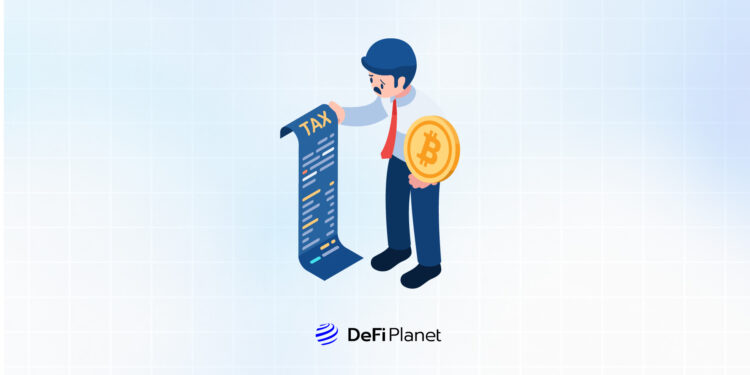Last updated on June 4th, 2025 at 10:57 am
As cryptocurrencies get increasingly integrated into mainstream finance, tax policies have emerged as a critical regulatory tool. Governments worldwide have introduced various frameworks to generate revenue from the sector. While these efforts add legitimacy to the industry, they also raise questions about whether such policies promote growth or hinder innovation.
This article examines the current state of global crypto taxation, its implications for the sector’s principles of decentralization and openness, and whether these policies support the industry’s growth or stifle its innovation.
The Evolution of Global Crypto Tax Frameworks
The United States set an early precedent in 2014 when the Internal Revenue Service (IRS) categorized cryptocurrencies as property subject to capital gains tax. This decision created a ripple effect, influencing how other nations approached crypto taxation. Today, we see a diverse landscape of regulatory frameworks, each reflecting different national priorities and approaches to innovation.
Major economies have developed structured approaches to crypto taxation that aim to provide clarity while maintaining fiscal oversight.
The United States treats crypto as property, applying capital gains tax to trades and income tax to mining and staking rewards. This framework offers predictability but faces criticism for its complexity. The United Kingdom takes a similar approach but has introduced innovations like a £3,000 tax-free allowance for crypto capital gains starting in 2024.
Australia and Canada have implemented balanced frameworks that encourage long-term investment through tax incentives. Australia’s 50% discount on capital gains for assets held over a year exemplifies how tax policy can promote wealth-building over speculation. Similarly, Canada’s approach of taxing only half of capital gains helps maintain market participation while ensuring revenue collection.
However, not all tax frameworks are designed to foster growth. Nations like India, Denmark, and Ireland impose heavy levies, with India implementing a 30% flat tax on crypto earnings alongside a 1% transaction tax. These policies have driven startups to relocate to tax-friendly jurisdictions such as Dubai, exemplifying the challenges of high taxation in an industry rooted in decentralization. Similarly, Japan’s steep tax rates of up to 55% deter many participants, despite its well-defined regulations.
RELATED:
- Why is Crypto Thriving in India Despite Discouraging Tax Regime?
- Comparing Crypto Tax Policies Across Nations: What You Need to Know
Meanwhile, some jurisdictions have recognized crypto taxation as an opportunity to attract innovation and investment. Malta and Portugal have emerged as pioneers in these crypto-specific tax incentives strategies. Portugal recently introduced a 28% tax on short-term crypto gains while keeping long-term holdings mostly tax-exempt. Malta exempts personal crypto transactions from capital gains tax.
The United Arab Emirates, particularly Dubai, has positioned itself as a global crypto hub through its zero-tax policy. El Salvador’s complete exemption from capital gains tax on crypto represents perhaps the most aggressive stance in attracting blockchain innovation.
This disparity in tax regimes has led to regulatory arbitrage, with businesses and investors flocking to crypto-friendly nations. Jeff Park summarized this phenomenon succinctly:
“Why are so many random countries offering 0% capital gains tax on crypto? It’s because they know this is a once-in-a-lifetime opportunity to become the next Switzerland or Singapore.”
“They have them paying tax on crypto and I don’t think that’s right. #Bitcoin is money and you have to pay capital gains tax if you use it to buy a coffee? I was talking with a friend he said ‘it really shouldn’t be taxed’ and I agree.” – @realDonaldTrump
— Michael Saylor⚡️ (@saylor) October 30, 2024
The Growth Argument: How Taxation Can Support Development
A well-structured tax framework signals governmental recognition and acceptance of cryptocurrencies. Clear frameworks build trust among institutional investors and the public, enhancing the legitimacy of the sector. For example, the IRS’s classification of cryptocurrencies as property validates their status as tradable assets. This legitimacy is crucial for the industry’s long-term sustainability and integration with traditional finance.
Thoughtful taxation policies can discourage excessive speculation while promoting responsible investment behavior. For example, Japan’s higher tax rates for short-term gains exemplify policies aimed at curbing reckless speculation and fostering sustainable growth.
Tax compliance frameworks act as effective deterrents against financial crimes, such as money laundering, tax evasion, and fraud. Transparent taxation ensures adherence to anti-money laundering (AML) and know-your-customer (KYC) standards, bolstering the integrity of the financial ecosystem.
For instance, the European Union’s Anti-Money Laundering Directive (AMLD5) incorporates cryptocurrency taxation measures, which have been instrumental in reducing illicit activities. Such frameworks provide both security and legitimacy, further supporting the industry’s growth.
Finally, the hope is that tax revenue from crypto transactions will be reinvested into the blockchain ecosystem to support innovation and infrastructure. Governments can use these funds to fuel research, innovation hubs, and regulatory improvements, aligning blockchain growth with national economic goals.This creates a virtuous cycle where market participation funds future innovation and development.
The Innovation Challenge: When Taxation Becomes a Barrier
High tax rates and complex compliance requirements can pose significant challenges for blockchain startups. High taxes on crypto gains disproportionately affect small investors, reducing market liquidity and slowing adoption. Retail investors, who are crucial for early-stage markets, often find the financial burden overwhelming. India’s tax regime has driven many promising projects to relocate to more accommodating jurisdictions.
Heavy taxation can undermine cryptocurrencies’ foundational principles of financial autonomy and accessibility. As MicroStrategy’s Michael Saylor argues,
“Bitcoin is money, and you have to pay capital gains tax if you use it to buy a coffee? That’s not right.”
“They have them paying tax on crypto and I don’t think that’s right. #Bitcoin is money and you have to pay capital gains tax if you use it to buy a coffee? I was talking with a friend he said ‘it really shouldn’t be taxed’ and I agree.” – @realDonaldTrump
— Michael Saylor⚡️ (@saylor) October 30, 2024
Policies that impose heavy burdens discourage spending and stifle innovation. Balanced, clear tax regulations are necessary to encourage participation and compliance.
The lack of harmonized international tax policies creates significant compliance challenges. It increases operation costs and complexity for crypto-based service providers while also confusing individuals on how to be faithful citizens. Changpeng Zhao, the former Binance CEO aptly observed:
“Many people want to pay taxes correctly, but they need guidance. Clear tax policies would encourage wider participation and compliance.”
Finding Balance: The Path Forward
We have previously argued about the sustainability of crypto tax revenue for governments. and why it is not as easy as it sounds and or look like. The challenge for policymakers is not whether to tax cryptocurrency activities, but how to do so in a way that supports rather than hinders the sector’s transformative potential. Governments must recognize the nuanced needs of the crypto sector to avoid stifling innovation.
Countries that offer clarity, incentives for long-term investment, and reasonable tax rates are more likely to cultivate thriving blockchain ecosystems. For example, in the United Arab Emirates, Dubai’s zero-tax policy has attracted startups, investors, and exchanges, solidifying its status as a blockchain hub.
Successful tax frameworks will likely feature:
- Clear guidelines that provide certainty for market participants
- Incentives for long-term investment and sustainable market practices
- Simplified compliance procedures to reduce administrative burdens
- International coordination to minimize regulatory arbitrage
We have previously argued about the sustainability of crypto tax revenue for governments. and why it is not as easy as it sounds and or look like. As the industry matures, tax policies must evolve to reflect both the unique characteristics of digital assets and the need for sustainable market development.
In summary, crypto taxation is a double-edged sword. While clear tax frameworks enhance legitimacy and support responsible investment, excessive taxation risks undermining the sector’s potential for innovation. The jurisdictions that succeed in this balancing act will likely emerge as leaders in the global crypto economy, attracting both innovation and investment while maintaining fiscal responsibility.
Disclaimer: This piece is intended solely for informational purposes and should not be considered trading or investment advice. Nothing herein should be construed as financial, legal, or tax advice. Trading or investing in cryptocurrencies carries a considerable risk of financial loss. Always conduct due diligence.
If you want to read more articles like this, visit DeFi Planet and follow us on Twitter, LinkedIn, Facebook, Instagram, and CoinMarketCap Community.























